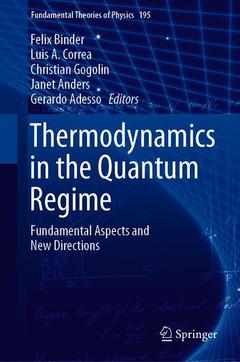Description
Thermodynamics in the Quantum Regime, 1st ed. 2018
Fundamental Aspects and New Directions
Fundamental Theories of Physics Series, Vol. 195
Coordinators: Binder Felix, Correa Luis A., Gogolin Christian, Anders Janet, Adesso Gerardo
Language: English
Keywords
Quantum thermodynamics; Quantum refrigerators/engines; Quantum thermal machines/thermodynamics cycles; Quantum fluctuation relations; Heat and work in the quantum regime; Thermal operations; Equilibration and thermalization in closed systems; Maxwell's demon/Szilard engine; Information thermodynamics; Non-equilibrium thermodynamics; Finite-size thermodynamics
998 p. · 15.5x23.5 cm · Hardback
Description
/li>Contents
/li>Biography
/li>Comment
/li>
Quantum Thermodynamics is a novel research field which explores the emergence of thermodynamics from quantum theory and addresses thermodynamic phenomena which appear in finite-size, non-equilibrium and finite-time contexts. Blending together elements from open quantum systems, statistical mechanics, quantum many-body physics, and quantum information theory, it pinpoints thermodynamic advantages and barriers emerging from genuinely quantum properties such as quantum coherence and correlations. Owing to recent experimental efforts, the field is moving quickly towards practical applications, such as nano-scale heat devices, or thermodynamically optimised protocols for emergent quantum technologies.
Starting from the basics, the present volume reviews some of the most recent developments, as well as some of the most important open problems in quantum thermodynamics. The self-contained chapters provide concise and topical introductions to researchers who are new to thefield. Experts will find them useful as a reference for the current state-of-the-art. In six sections the book covers topics such as quantum heat engines and refrigerators, fluctuation theorems, the emergence of thermodynamic equilibrium, thermodynamics of strongly coupled systems, as well as various information theoretic approaches including Landauer's principle and thermal operations. It concludes with a section dedicated to recent quantum thermodynamics experiments and experimental prospects on a variety of platforms ranging from cold atoms to photonic systems, and NV centres.
This book has been written by over 100 internationally recognized experts in this novel research field. They were invited by the editors based on their expertise. The editors are as follows:




